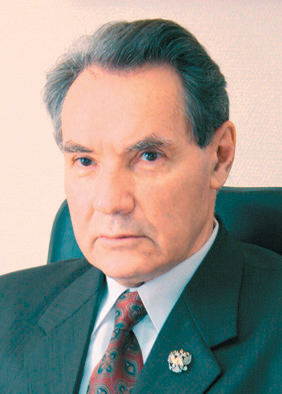BORIS V. GUSEV
 – The President of Russian and International Engineering Academies
– The President of Russian and International Engineering Academies
– Associate of Russian Academy of Science
– USSR and RF State Prizes Laureate
– RF Government Prize Laureate
– Honoured Scientist of the RF
– Expert of “RUSNANO”
– Doctor of Engineering, Professor
– Full member of many Russian and foreign Academies of Science and Scientific communities
Born May 13, 1936, in the settlement of Shilovo, Ryazan Region. Studied at Tyrnovo seven-year school, Ryazan technical school (now college) of railway transport. After completing two years in Moscow State Institute of Railway Engineering, he was sent, within student exchange program, to continue education to Warsaw Polytechnic Institute, graduating in 1961 with master’s degree (Engineer in Railway Engineering).
B.V. Gusev is one of the founders and the first president of the Engineering Academy of USSR (1990), later transformed into the Russian and International Academies of Engineering (1991-1992). He has been President of the academies since the foundation day. President of Russian Union of Public Academies of Sciences. First Deputy Chair of Organizing Committee of I Congress of Russian Engineers (2003), and Co-Chair of Organizing Committee of II Congress of Russian Engineers (2010). Co-Chair in Supreme Engineering Council of Russia.
From 1961, B.V. Gusev worked in Tashkent and Dnepropetrovsk. From 1973, he worked in Glavmospromstroymaterialy, Moscow, where he took an active part in construction of structures for 1980 Moscow Olympic Games. From 1994 to 1999 he was CEO of State Scientific Centre within main Scientific & Research institutes of Gosstroy RF (Central Scierntific & Research Institute for Construction Structures (TsNIISK); Scientific & Research Institute for Concrete and Reinforced Concrete (NIIZhB), Scientific & Research Institute for Basements.
B.V.Gusev has solved the following theoretical problems:
- force interactions of executive device of compacting machine with elastic-viscous medium;
- structural strength of composite materials, of concrete type;
- developed the bases of non-linear mathematical theory of concrete corrosion;
- performed projects on optimization of technologies and creating new highly-efficient production lines.
Theoretical projects were implemented in practice:
- created parametric range of stroke-vibrational machines which are being serially produced;
- designed new types of production lines for factories of construction industry;
- the work is being made for providing high homogeneity and non-segregation of suspensions and emulsions in cavitational installations.
Professor B.V. Gusev made great contribution in development of the industry of precast concrete. According to the data of Gosstroy of USSR, in 1989, over 10 million m3 of reinforced concrete was made by stroke-vibrational technology. The results of his research work were widely used in construction of Centre for International Trade, and structures for 1980 Moscow Olympic Games.
At the present time, B.V. Gusev develops the bases of nanostructures of cement systems for increase of concrete strength (2-3 times), and creating suspensions and emulsions of high homogeneity and non-segregation for obtaining various materials, including those for creating protective coatings. B.V. Gusev is the expert of Rosnano and Skolkovo-Nanotech.
B.V. Gusev is a prominent scientist and organizer of science and education. He is the founder of scientific school. He was scientific adviser for 10 Doctors in Technical Sciences, 80 PhDs (Candidates in Technical Sciences) in a range of countries of the world. Authored over 600 science papers, 30 books (monographs, tutorials) in English, Georgian, Polish, Russian, Ukrainian and other languages. He is also a prominent inventor; over 130 patents was obtained.
B.V. Gusev took an active part in the work of Advisory working group of Presidential Commission on Modernization and technological development of Russian economy, in scientific-research councils of Russian Academy of Sciences, Government Expert Councils, The Council of Federation of the Federal Assembly of the Russian Federation, Higher Attestation Commissions of USSR and Russia, scientific-research councils of a range of ministries and departments of USSR and Russia.

